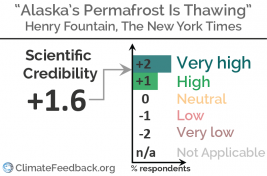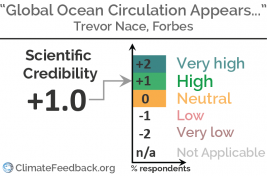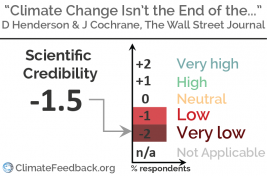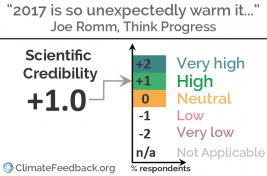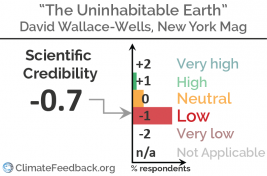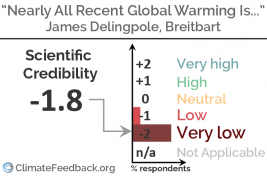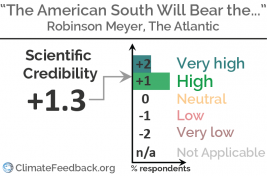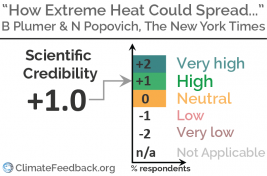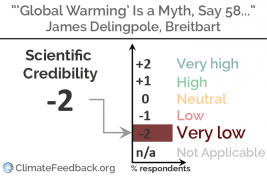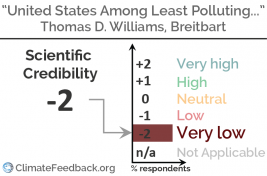Article Reviews
“Is this article consistent with the latest thinking and knowledge in science?”
“Would experts in this field endorse the main message of this article?”
These are the types of questions our “feedbacks” are designed to answer. If the feedback is positive, you can generally assume the information you’re reading is of high credibility. If it’s negative, however, you may want to read with extra care and attention — some of the information contained and conclusions reached are not consistent with science.[1]
New York Times accurately assesses the state of Alaskan permafrost
in The New York Times, by Henry Fountain
"The article is accurate in its descriptions of the physical and ecological processes that are behind permafrost changes. It also does a good job of getting across the nature of the work of actual scientists working in the field, what they are doing and why they are doing it."
— 24 Aug 2017
Forbes article accurately describes research on Atlantic ocean circulation weakening, but headline goes farther
in Forbes, by Trevor Nace
"This is an accurate, concise summary of the slowdown of the Atlantic Meridional Overturning Circulation (AMOC) and its possible future states. There are a couple of minor issues: specifically, one of the links goes to an irrelevant article, and it would be useful to have a couple more citations to the scientific literature. The title is possibly a little overstated; I might instead say that the AMOC is at risk of collapsing in a warming world."
— 09 Aug 2017
Wall Street Journal op-ed on economic consequences of climate change found naive by scientists
in The Wall Street Journal, by David Henderson, John Cochrane
"This is a very simplistic, almost naive op-ed on climate change impacts. Some assertions such as the one about CO2 being good for plants demonstrates that the authors do not know or understand how increasing CO2 is good or bad for plants, they are just repeating something they heard."
— 02 Aug 2017
2017 is on track to be among the hottest year recorded, scientists are not as surprised as ThinkProgress article suggests
in Think Progress, by Joe Romm
The scientists who have reviewed the article confirm it accurately reports that 2017 is on track to being one of the warmest years on record. Reviewers note this wasn’t as unexpected as the article states, but the fact that 2017 global surface temperature are that high is a clear reminder that global warming has not stopped or slowed down.
— 21 Jul 2017
Scientists explain what New York Magazine article on “The Uninhabitable Earth” gets wrong
in New York Magazine, by David Wallace-Wells
"While it is clear that ongoing warming of the global climate would eventually have very severe consequences, the concept of the Earth becoming uninhabitable within anywhere near the timescales suggested in the article is pure hyperbole. The author has clearly done very extensive research and addresses a number of climate threats that are indeed major issues, but generally the narrative ramps up the threat to go beyond the level that is supported by science."
— 12 Jul 2017
Breitbart article falsely claims that measured global warming has been “fabricated”
in Breitbart, by James Delingpole
"In a cursory attempt at both reporting and climate science, the author glibly highlights a document heavy on accusation and light on reasoned engagement with fact. Implying nefarious motives behind temperature measurement bias correction without providing readers any indication of why this is necessary is misleading and a dereliction of the author's journalistic responsibility."
— 11 Jul 2017
The Atlantic accurately reports on study of the economic impacts of continued climate change in the US
in The Atlantic, by Robinson Meyer
This story in The Atlantic by Robinson Meyer describes a new study on the distribution of economic impacts that result from continued climate change in the United States. The study finds that the impacts would not be uniform throughout the country, but would reduce GDP to a greater degree in southern states, for example, while the northernmost states could experience net economic benefits from warmer temperatures.
— 03 Jul 2017
New York Times story highlights the growing number of extremely hot days in a warming world
in The New York Times, by Brad Plumer & Nadja Popovich
"The study’s claims all appear to be based on sound, peer-reviewed research. The claims are in line with longstanding predictions and are not cherry-picked or unrepresentative, although there are uncertainties as always in any prediction."
— 26 Jun 2017
Breitbart misrepresents research from 58 scientific papers to falsely claim that they disprove human-caused global warming
in Breitbart, by James Delingpole
"This article grossly misinterprets open-access scientific papers by simply looking at graphs and entirely ignoring their meaning as explained by authors in the text."
— 08 Jun 2017
Playing semantics, misleading Breitbart article downplays US contribution to climate change
in Breitbart, by Thomas D. Williams
"This whole post is based on semantics and basically one big strawman fallacy. The author is deliberately confusing air pollution from suspended particulate matter (as discussed in the WHO report) with pollution from carbon dioxide emissions (as discussed in the Reuters link and the Paris Agreement). Even though CO2 does not impact our health through “disease-causing pollutants that get into people’s lungs”, it does change our environment and the Earth’s climate, and in that sense does classify as a pollutant."
— 06 Jun 2017
[1] Note: These feedbacks do not constitute endorsements of the author’s political or economic ideology, rather they are assessments of the scientific foundations and reasoning of the argumentation contained within each article.

